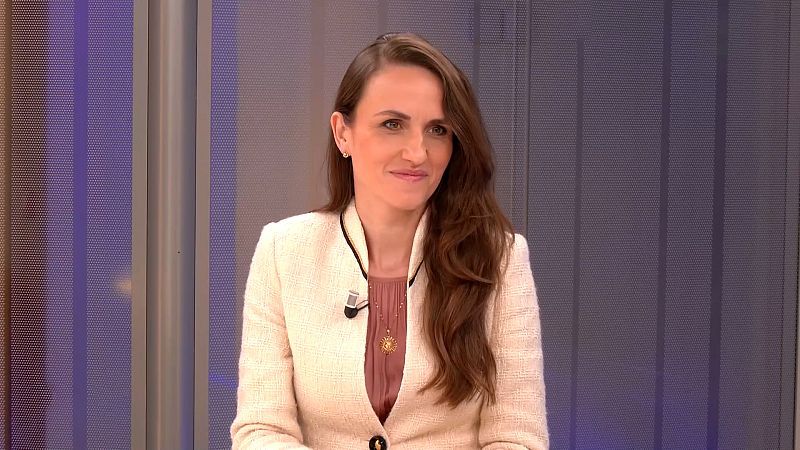Romanian Foreign Minister backs Trump's push to fully wean EU off Russian energy

Romania agrees with United States President Donald Trump’s “ambition” to request that all European Union countries cut their energy ties to Russia in response to the war in Ukraine, the country’s foreign minister, Oana Țoiu, has told Euronews’ 12 minutes with.
“We agree in Romania—and I have mentioned this to Secretary of State Marco Rubio as well—that the ambition that President Trump has put forward, the request actually to members of the European Union, to cut off from energy sources from Russia that generate profit that is used to fund the war, is the proper decision,” Țoiu explained.
“Romania has taken that decision for a while now,” she added.
Trump suggested in September that he won’t slap further US sanctions on Russia until EU countries stop funding Putin’s war chest by purchasing Russian gas and oil. Trump has also moved to impose so-called ‘secondary tariffs’ on India for its importation of Russian-origin oil, and has threatened to target other nations with similar levies.
The EU has significantly scaled back its reliance on Russian energy since the launch of the full-scale invasion of Ukraine in 2022 and is planning to phase out these products completely by 1 January 2028.
But Hungary and Slovakia continue to be major importers of Russian energy and have resisted pressure from Trump to cease their purchases.
The issue is expected to resurface next week when EU leaders gather for a summit in Brussels. The EU executive, under pressure from Trump, wants to impose tariffs on Russian oil still entering the bloc as part of a 19th package of sanctions from Russia, making imports more expensive and forcing both Budapest and Bratislava to diversify suppliers.
But Slovakia’s Prime Minister Robert Fico has already voiced his opposition and could derail the adoption of the sanctions.
Minister Țoiu spoke to Euronews hours before Donald Trump announced he would meet with Russia's President Vladimir Putin in Hungary to try to resolve the war in Ukraine.
Asked what she had said to her US counterpart, Secretary of State Marco Rubio, in relation to the war in Ukraine during a recent visit, Țoiu said they had spoken about a “common ambition to help to have a peace deal in Ukraine” and about their “reluctance in terms of what we see coming from Russia.”
“We do not see the proper action, gestures, or decisions in that [peace] direction,” she said in relation to the Kremlin.
“That is why we're having a continuous conversation on the increase of pressure.”
Time ‘of the essence’ in fighting Russia’s hybrid warfare
Meanwhile, Romania, which shares the EU’s longest land border with Ukraine, finds itself in the crossfire of Russia’s hybrid war.
A presidential run-off was cancelled last December based on disclosed intelligence suggesting Russia had meddled in the campaign, which saw a little-known outsider with extreme views, Călin Georgescu, sweep to an unexpected victory in the first-round vote.
According to Țoiu, “Those threats do not disappear”.
“Even if in Romania, in Moldova, the pro-European path has won spectacularly (in recent elections), we believe and we expect that the interference will continue in the sense that we see the same type of intentions in terms of malign narratives.”
“So it is very important that we defend ourselves not just at the country level but at the European Union level and that we support countries that want to join the European Union in the same process.”
The country has also documented at least 20 instances of suspected Russian drone interference, most recently in early September when a drone violated Romania’s airspace during a widespread Russian drone attack on Ukraine, prompting F-16 pilots to scramble.
Asked whether Romania was ready to down intruding aerial vehicles considered a threat, minister Țoiu said, “Yes, we are prepared. We have changed our laws recently, so we allow for the pilots of the planes that are following the drones to shoot, if that is the case. Also, we have changed the legislation so we allow for different air defence systems to be able to also, in the case it is needed, to shoot them down.
“It is always a matter of assessing the risk of whether the actual shooting down of the drone doesn't create more risk on the ground than the potential risk from the drone itself.”
On Thursday, the European Commission unveiled a plan to protect its eastern flank from drone incursions, sometimes referred to as a “drone wall”, that would be fully functional by 2027.
Țoiu supported the urgency of the timeline. Romania has recently said it will partner with Ukraine to manufacture defensive drones that could be used to deter Russian incursions along Romania’s border and to support other neighbouring countries.
“We already have in the private industries projects that are Romanian-Ukrainian in the sense that they also test the drones commonly using their common knowledge, and they have also recently acquired investments from the United States,” minister Țoiu said.
“We want to continue with even more projects, even from the public sphere, and to be able to have that not just for our own needs in terms of military procurement and capacity, but also to create this offering together with combat-tested know-how that the Ukrainians now have to have that offering for other states.”
Today

